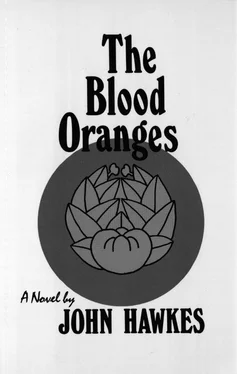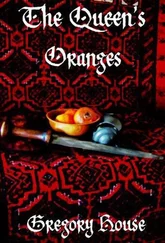A single gasp went up then from the serious faction of the crowd, Fiona squeezed my hand and held her breath as if all her fear and courage and sweeping empathy were now mounted forever in still marble, across the canal the screaming woman burst open her shutter, glared out, and as quickly smashed it shut again, the brute-backed leader of the fire brigade fell to his knees, stuck out his arm, waited — because with a sucking sound the front of the old bus started down, dipped with sudden unalterable purpose toward the stinking depths of the timeless pestilential canal. Dipped, started down, but was then somehow relinquished by the deep intestinal tug of the canal and slowly, slowly, rose again to its original horizontal position with nothing to mark the near disappearance of motorbus and occupants except a thin ripple spreading out from the front bumper, some agitation in the orange, and a sigh from those of us who did not suffer from the abnormal attitudes born of the bad blood carried to this warm coast centuries before from central Europe.
“Do something, Cyril,” she whispered then. “Please, baby.”
All those on the embankment were quiet. Several of the leather-garbed stumping firemen began, like lunging turtles, to tie together two slender ladders with strips of wire. Fiona put her lips to my cheek.
The occupants of the bus were unaware of Fiona’s efforts on their behalf, were apparently unaware of the will power she was now exerting. Yet might not the power of Fiona’s psyche have been as much responsible as anything else for the continued presence of the motorbus on the viscous surface of the historically significant canal? And, as far as I could see, they were unaware of the disaster which, a moment before, had all but concluded. Pigeons, ladders, Fiona’s white face and yellow coat, an old man with a stack of twigs on his back and determined to tell someone that they should tie a rope to the head of a pike — none of it meant anything to the pathetically small group of occupants inside the bus. The driver gripped his wheel, the man and woman were holding the edges of the seats in front of them, only the heads of the three female children and the black dog were visible, but those few faces were cold, expressionless, unusually small, and were, all seven of them, including the dog’s, forced rigidly to the front. As I bent down to get a better look through the windows it occurred to me that driver and passengers did not in fact comprehend that they were afloat precariously in an ancient canal, but rather were expecting some more conventional catastrophe and were still looking ahead toward the as yet invisible landscape of the impending crash. It occurred to me also that beneath the water those six people and the small black animal would be lost, so to speak, in so large and so nearly empty a motorbus.
And then it sank. Again the crowd gasped, the old man threw down his twigs, Fiona with one round movement of her shoulders tore free of my hand. But of course I was familiar with all the bright severity and wildness of Fiona’s spirit and now was ready for one of her stronger displays of grace and determination. So in my left arm I caught her slender waist exactly as the motorbus went down.
“Wait a minute,” I whispered, feeling the fight going out of the stomach muscles against my arm, “just wait a minute, Fiona. It’s all right.”
Then once again the laughing faction of the crowd was laughing, and even while she felt my soothing voice in her ear and the comforting tension of my forearm drawn tight across the central portion of her body, still Fiona must have understood the laughter and forced herself to see what was actually happening to the old bus before our eyes. Because now it sat more firmly than it had ever rested on dirt road or cobbled street, sat immobile with all four wheels solidly positioned on the hard bed of excrement which, down through the centuries, had accumulated like lava in the bottom of the black canal. But windows, roof, luggage strapped to the roof, spare tire, hood — all the upper half of the old high-bodied machine rose above the water, would no doubt remain emerging from that motionless water as long as the canal walls stood and there were sudden figures to shout croak peonie and tip the contents of stinking buckets into the holes and stone gutters that fed the very smell of time. The waters were not deep (how like these villagers and members of the fire brigade and the old men not to know the depth of their own canal), not deep, yet deep enough to rise well above the wheels, to flood the interior of the bus at least as high as the knees of the still unmoving occupants, with its black weight to anchor the motorbus where it sat forever. In all the village there was no hoist to lift it, no barge to drag it down to the mouth of the canal. But even if they could, would red-eyed peasants ever take the trouble to remove the enormous old motorbus from a canal that had once been choked with the bodies of dead barbarians? I knew they would not.
“Baby, look! That little girl is waving at me!”
Then Fiona snatched my face into her two hands, kissed me, wheeled about and waved back at the child, while even above the shouts and clatter of the fire brigade we heard, suddenly, the muffled terror-stricken yelps of the black dog that was now jumping from seat to seat up and down the long water-filled interior of the half-sunken bus. Momentarily out of sight, it reappeared with wet shredded ears and tail, with wet fur slick on its belly and on its short black sturdy legs, had obviously fallen, had been swimming and barking in the fetid water between the seats. And now the woman was attempting to wade to the help of the smaller children who were kneeling, apparently, on the wooden seats, the oldest girl was waving timidly at Fiona, the tall black-haired man was stooping and holding to his chest an armful of photographic equipment and grinning.
“Oh, Cyril, he’s handsome! And look at his wife!”
The sucking of the boots of the brute-backed leader of the fire brigade, the sound of shattering glass, the wheezing and laughter and shouts of the crowd, all of whom clearly suffered from some congenital rasping respiratory disease, the thin high cries of the sopping wet dog — suddenly through all this abrasive noise I heard, as if directly into my left ear, the strong but milky vocal qualities of Fiona’s voice which told me, in sense and tone, that she was once more making one of her aesthetic evaluations.
“My God, he’s handsome. Just look at him!”
She had twisted her head in one direction, her shoulders in another, at the same time twisted her hips in the same direction as her sharp-featured and happily agitated face, and out of all this sinuous exertion and equilibrium had come her voice, her judgment, another fresh gift of discovery which, as usual, she gave to me swiftly and without hesitation. So now I listened, lit one of my clumsy cigarettes, glanced around at all the illiterate faces and powerful but sagging shoulders, and then leaned down again for another and better look at the man in the half-sunken bus. Fiona was already waving again at the white-faced girl.
Stroked my chin, leaned down, frowned a little and got some intensity into my large brown eyes, until suddenly I caught him there knee-deep in the excremental waters, from all the chaos of dog and children and large unsmiling wife was able to isolate his grinning face and for a moment to hold him still, so to speak, for appraisal.
She was right. As usual Fiona had made another good aesthetic judgment. Because the tall black-haired man stooping in the bus window was dressed, I could see, in a powdery blue tweed jacket and black turtleneck shirt which was a combination that had always been one of Fiona’s favorites. More important, perhaps, he had a well-weathered face, a face not tanned and darkened in the wind and sun like mine, for instance, but so weathered and pebbled, so grained in darkness and cold rain that it resembled stone. Gray stone. I knew I had never before seen the thin lips, narrow bright boyish eyes, high sandblasted cheekbones, pointed ears, black hair curling across his forehead and curling in a few odd ringlets in what appeared to be a beard newly grown. Yet I recognized his face immediately because its exact replica, an image of Saint Peter that was perfect except for the broken ears, had been chiseled along with the head of Saint Paul into the granite arch of the entrance to the squat church where one candle, I knew, was still burning. Saint Peter in stone. No wonder Fiona called his striking features to my attention. Any woman would have found Saint Peter attractive. And in the case of my wife, how could Fiona help but appreciate a face whose exact replica we had seen and admired during every one of our rambling visits to the squat church? On every one of our visits the stone face, with its strength and malice, had invariably caused Fiona to hold her breasts while standing perfectly still and gazing up at it. Now of course she was busily waving at the frightened child.
Читать дальше












